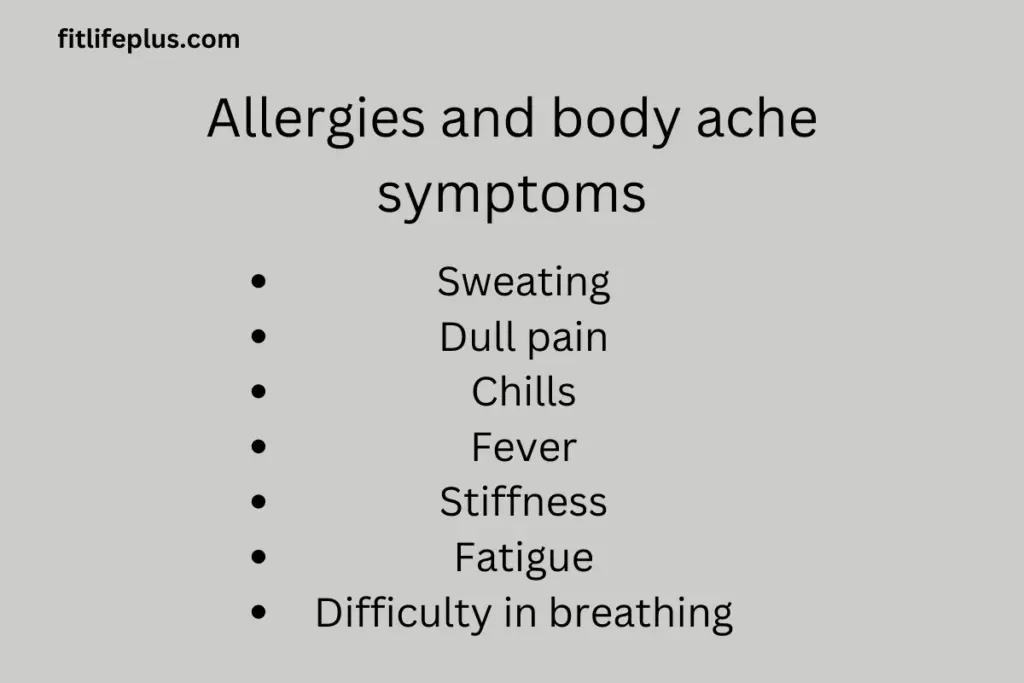
While thinking of allergy symptoms, the first thing that comes to mind is itching in the eyes, runny nose, sneezing, and congestion. But do you know you can also experience body aches and fatigue during an allergic reaction?
Allergy sufferers go through many symptoms that result in discomfort. Allergies can result in many symptoms that can be very irritating. The symptoms that are less apparent than sneezing include body aches and fatigue. These symptoms are not rare, but they often go undiagnosed.
Allergies and fatigue
Some allergy sufferers may have to experience chronic fatigue. Chronic fatigue syndrome results in prolonged and extreme fatigue without any visible reason. If your doctor cannot diagnose the root cause of fatigue, it must be due to allergies.
People suffering from allergies often have an over-sensitive immune system which is also common in people with CFS. In many people, the treatment of allergies helps in reducing fatigue. In such cases, the treatment of allergies also helps in reducing fatigue.
Allergies and body aches
When the human body takes a harmless substance as dangerous and harmful, it shows its response, resulting in an allergy. It responds similarly to viruses and colds, even though the pollens don’t cause any harm. The immune system starts producing antibodies against the intruder, which results in inflammation.
This whole process produces muscle and body aches and makes them swollen. In the case of seasonal allergies, where the allergen is inhaled, the body aches are focused on the chest and the throat areas. At the same time, food allergies can cause pain in different body parts.
Body ache symptoms

In the body ache, there is consistent pain in different parts. But things can also get complicated; here are the most common symptoms of allergies and body aches.
Sweating
Sweating is the natural way for the body to cool itself. The hypothalamus triggers the sweat to balance the temperature when it encounters a threat or danger. It’s the same regarding body aches, which can signify that the body is fighting against intruders.
Dull pain
The body pain is usually dull, and you feel consistent pain in one or more body parts. The intensity varies in different body parts but is generally felt when more pressure is applied. Some people can experience pain in specific parts of their body, while some can feel it in their whole body.
Fatigue
Tiredness, weakness, and fatigue are the first signs of body aches due to allergies. It occurs when the immune system is fighting against the allergens. It can also result in other symptoms like headache or difficulty focusing.
Chills and fever
Fever and chills are linked with body aches. When the body’s immune system feels danger, it will result in chills and fever while fighting off the cause of it. However, it is not always the case; some people can have a fever without chills and vice versa.
Stiffness
Sometimes allergies-induced body ache results in specific problems like stiffness. It is common for the joints as they become difficult to move when stiff. That’s why the body ache is sometimes confused with arthritis.
Besides, remember that the fever and chills accompanying body aches are usually signs of a virus or other infection, not an allergic reaction.
Difficulty in breathing
When allergies cause body aches, shortness of breath is the first symptom you will notice. It usually occurs when the immune system overreacts, resulting in the influx of histamine affecting the airways. It can make breathing more difficult and results in localized pains in the abdomen and chest.
Treatment
The effective treatment of body aches involves understanding the main issue behind them. If the pains are due to an infection or virus, the medicine may include taking over-the-counter medication with a bit of patience.
But when allergies are the leading cause of body aches, the treatment revolves around strictly avoiding the possible allergens. Your doctor may recommend you take corticosteroids to reduce the body’s reaction.
OTC medications (Over the counter medications)
Over-the-counter medications like acetaminophen and ibuprofen can reduce inflammation and pain due to body aches. Just take the medicines according to your healthcare provider’s instructions.
Rest
Rest is the best way to get rid of body aches. It gives your body enough time to heal by decreasing inflammation and reducing stress. It can also reduce the severity of body aches.
Heat and cold therapy
Applying cold and heat to the affected areas can eliminate the pain. Heat therapy is highly beneficial in increasing blood flow. Simultaneously cold therapy reduces the inflammation and the intensity of the body.
Exercise
A moderate exercise routine releases the tension from your muscles and helps them relax. It also reduces the overall severity of the aches. It doesn’t apply if you have a muscle ache due to an injury. In such cases, strenuous movements can affect your muscles.
Changes in your diet
By taking an anti-inflammatory diet, you can reduce body aches. It involves increasing the intake of fresh vegetables, fruits, fatty fish, and whole grains while reducing the intake of refined carbs, sugary or carbonated drinks, and processed meats.
Sublingual Immunotherapy
This procedure is the best option if your body aches due to allergies. SLIT is a form of allergy immunotherapy for allergy in which the body is slowly exposed to the allergens that your body reacts with. They desensitize your immune system with these allergens, giving you permanent long-term relief.
When to see a doctor?
Body aches related to allergies can also be a symptom of other conditions like viral infection, flu, or cold. You must consult a doctor if:
- You feel pain in the chest, ribs, or lungs
- Your temperature goes higher than 103 degrees
- You experience vomiting or continuous nausea
- Your body aches last more than a few days
Though rare, a person can cough hard enough to cause a rib fracture. It can cause severe pain that doesn’t improve with medications. Consult your doctor if you feel anything wrong with the ribs.
FAQ’s
How to get rid of body aches due to allergies?
Taking allergy medications should be a priority to treat body aches. If you are experiencing pain, you can take over-the-counter anti-inflammatory medications. Take a warm bath or use the heating pad to relieve the pain.
Can allergies feel like flu symptoms?
The symptoms of allergies and the flu are similar as they concern the respiratory system. Sore throat, congestion, headaches, fatigue, sneezing, and runny nose are all the typical flu symptoms you will also see in the case of allergies.
Can allergies cause muscle and joint pain?
Yes, neck, joint, and back muscle pain can also result from allergies. The main reason is that allergies can result in inflammation. The inflammation results from your body’s reaction to removing the allergens.
How long does the allergy pain last?
The allergic reactions can stay in the body at different times. They can disappear in a few hours and may remain for weeks. The allergy can last for months; for example, in the case of seasonal allergies, if the person has continuous exposure to the allergens, he can keep suffering for extended periods.
Conclusion
Seasonal allergies can result in body aches with common symptoms like a runny nose, sneezing, watery eyes, and cough. The muscle ache and joint pain are due to the immune system’s response to the allergens.
The allergies result in excessive sneezing and coughing, which can also result in body aches. It can help your chest with a pillow or by applying a heating pad that helps heal. Home remedies and other OTC medicines can help in relieving these symptoms.
Don’t ignore the pain in your chest, as it can be related to your heart. You can support your chest with a pillow or by applying the heating pad while you heal. But consult a doctor immediately when pain in any area disappears or worsens with time.





